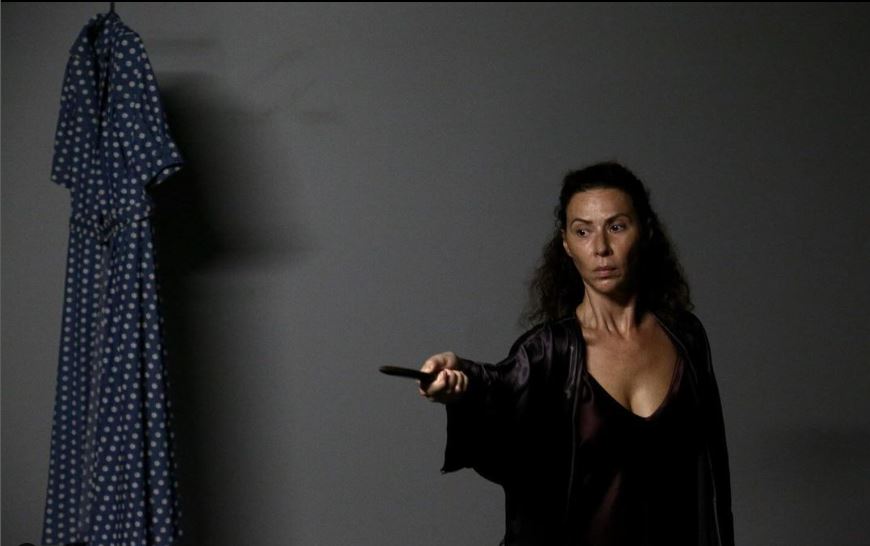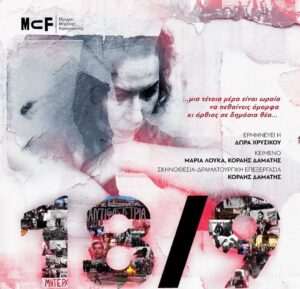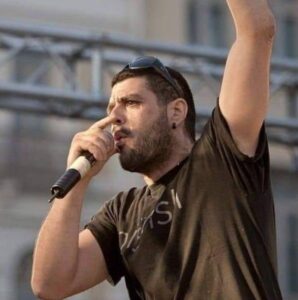How the murder of Pavlos Fyssas awakened an entire society from its slumber

Last Sunday, the founding member of Generation 2.0 for Rights, Equality & Diversity, Nikos Deji Odubitan, spoke about racism, ethnonationalism, and the far right in a discussion that included the editor-in-chief of the magazine Antivirus, Vasilis Thanopoulos, the political scientist Despoina Paraskeva-Veloudogianni and the audience, moderated by journalist Niovi Anazikou.
Immediately after the performance of “18/9,”* a monologue dedicated to the days when the criminal activities of Golden Dawn had become an evreryday issue, that lead to the murder of Pavlos Fyssas by Golden Dawn member Giorgos Roupakias, the discussion began with the impression left by the lead actress, Dora Chryssikou: the hope for the awakening of society against hatred. Since 2013, many things have changed, but many have not. Recently, as the defense of human rights continues to gain traction, the ideological marketing of hate speech has found a new starting point in the anti-WOKE stance.

 Beyond theory, and apart from any anthropological study or journalistic research, the experience of the actions and impacts of the far-right has left indelible marks.
Beyond theory, and apart from any anthropological study or journalistic research, the experience of the actions and impacts of the far-right has left indelible marks.
“From a very young age, I knew things that other kids my age had no idea about, like ‘fascist,’ ‘far-right’… We knew where we shouldn’t go, judging by the Greek flags waving outside. As a Black person born and raised in America Square, my friends and I had to know who the fascists were, what they were called, which shops they owned, the places they frequented, and their home addresses. And they, of course, knew us. We lived among them…” said Nikos Deji, explaining that the rise of the far-right and Golden Dawn‘s entry into Parliament in 2012 was not a shock to him; it was a natural continuation of a situation that had been developing for as long as he could remember.
Racist attacks had been occurring for years. “We knew the perpetrators, the victims, and why no one was ever prosecuted. In 1999, in front of my house, a man pulled out a gun and started aiming at and shooting Black people. A Nigerian collapsed, hit, and has been in a wheelchair ever since. The criminal was arrested but was deemed mentally disturbed, someone who just snapped and started shooting anyone dark-skinned he saw.” Such an incident marks you, shapes you, and creates feelings that are hard to describe.
In neighborhoods like Kypseli, where many individuals of African descent lived, even though the Black community was strong and arguably safe, fear was always present. This fear was intensified by the fact that we were not equal citizens in the country where we were born and/or raised. Many victims of Golden Dawn never reached the courts, either due to fear of threats or because the criminal organization bought their silence. There were many victims for whom public opinion hardly cared—migrants, LGBTQ+ individuals, Roma—beaten or dead until the shocking murder of Pavlos Fyssas finally awakened society. The idea that it was a gang-related settling of scores briefly passed through, because what other reason could there be to stab a young white Greek male?
 Society awakened Fyssas’ murder. Somewhere along the way, more and more people began to realize that the phenomenon of Golden Dawn is not a shooting star. It has been nurtured and incubated for years beside them, in the squares, in schools, on the streets, and it concerns them. It concerned them when, during the crisis, they received aid in the form of bags of potatoes from dark-clad “benefactors” with shaved heads. It concerned them when they watched interviews of Golden Dawn MPs being “cleaned up,” arm in arm with their wives, presenting their lifestyle like common celebrities. It concerns all of us. Us, our children, our friends. The far-right has poisoned an entire society, and this poison still “burns,” even though the big heads are in prison.
Society awakened Fyssas’ murder. Somewhere along the way, more and more people began to realize that the phenomenon of Golden Dawn is not a shooting star. It has been nurtured and incubated for years beside them, in the squares, in schools, on the streets, and it concerns them. It concerned them when, during the crisis, they received aid in the form of bags of potatoes from dark-clad “benefactors” with shaved heads. It concerned them when they watched interviews of Golden Dawn MPs being “cleaned up,” arm in arm with their wives, presenting their lifestyle like common celebrities. It concerns all of us. Us, our children, our friends. The far-right has poisoned an entire society, and this poison still “burns,” even though the big heads are in prison.
The WOKE movement began in America with the slogan of awakening the Black community, rallying together, and not tolerating racism and violence. The movement subsequently gave a voice to every social group that is treated as non-normal, unacceptable, whose place is on the margins. “Claiming one’s rights does not mean wanting to steal from the rights of others,” emphasized Nikos Deji. Social justice and equality are not a pie with measured pieces. They are rights that all individuals should enjoy. In our country, the WOKE movement spread to major cities, mainly Athens, driven by the need of “non-equal citizens,” second-generation children, Black people, and migrants to claim visibility, social equality, and above all, the right to citizenship. Today, the WOKE movement continues with the hidden expectation of social awakening, the hope that society will collectively utter “enough already” and reject hatred, bigotry, and discrimination. Because these are the foreign bodies in every society.
Photos: Marios Lolos (@marioslolos) – Alexandros Katsis
* “18/9” is a monologue of anguish and struggle.
At its center is the criminal activity of Golden Dawn, the murder of Pavlos Fyssas, and the emblematic trial of the Nazi organization.
Elements from real testimonies and actual events intertwine through fiction with the social portrait of a girl who was an eyewitness to a far-right crime, resulting in her life changing and facing relentless dilemmas.
The heroine in “18/9” is not an invincible, fearless, glossy heroine. She is transparent and fragile. We can see all her wounds. She is one of us—a neighbor, a friend, a sister—who is fighting her fears just hours before her testimony in the trial for the crimes of Golden Dawn. A simple person who becomes a subject of history.**
An idea by Dora Chryssikou, with text by Maria Louka and Korai Damati. At the Michalis Kakogiannis Foundation until 3/11/24.
**Part of the proceeds will be donated to support the “Pavlos Killah P Fyssas” Culture Association.

 Ελληνικά
Ελληνικά

